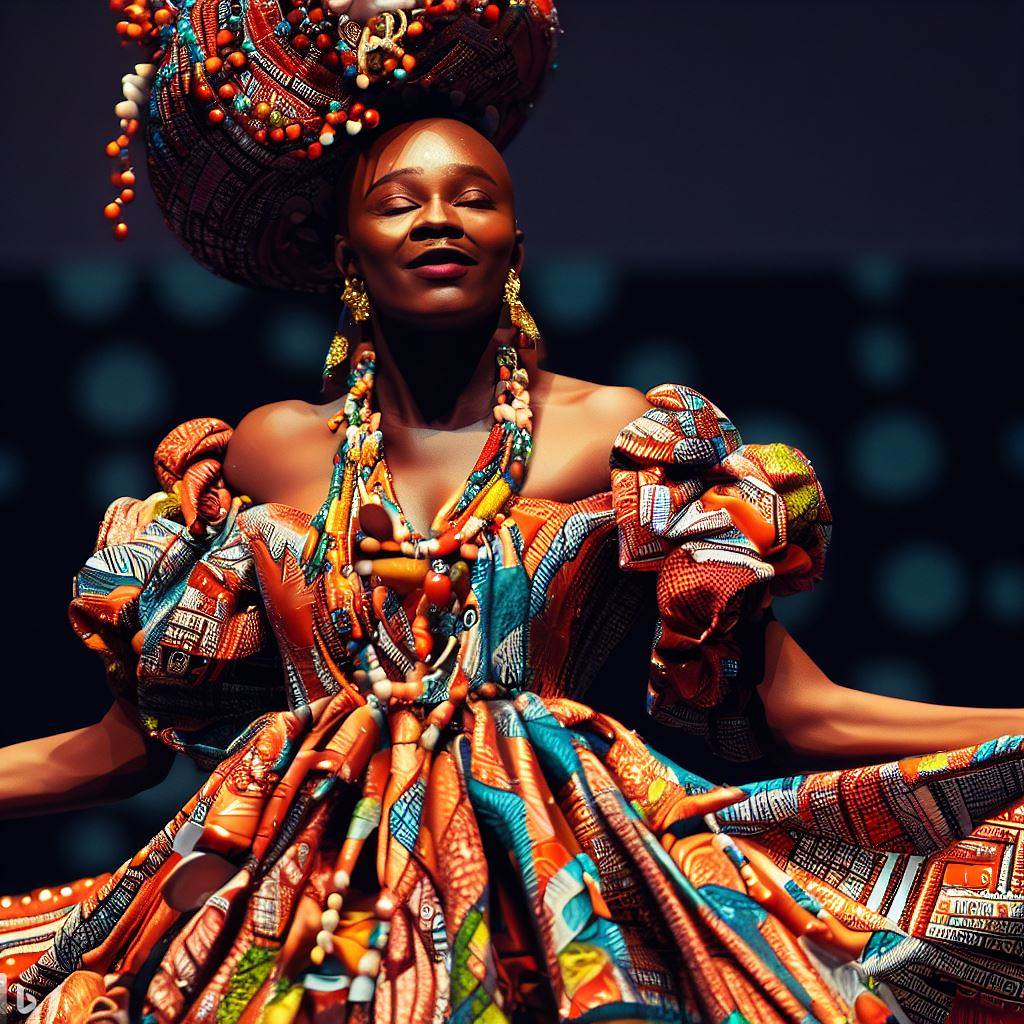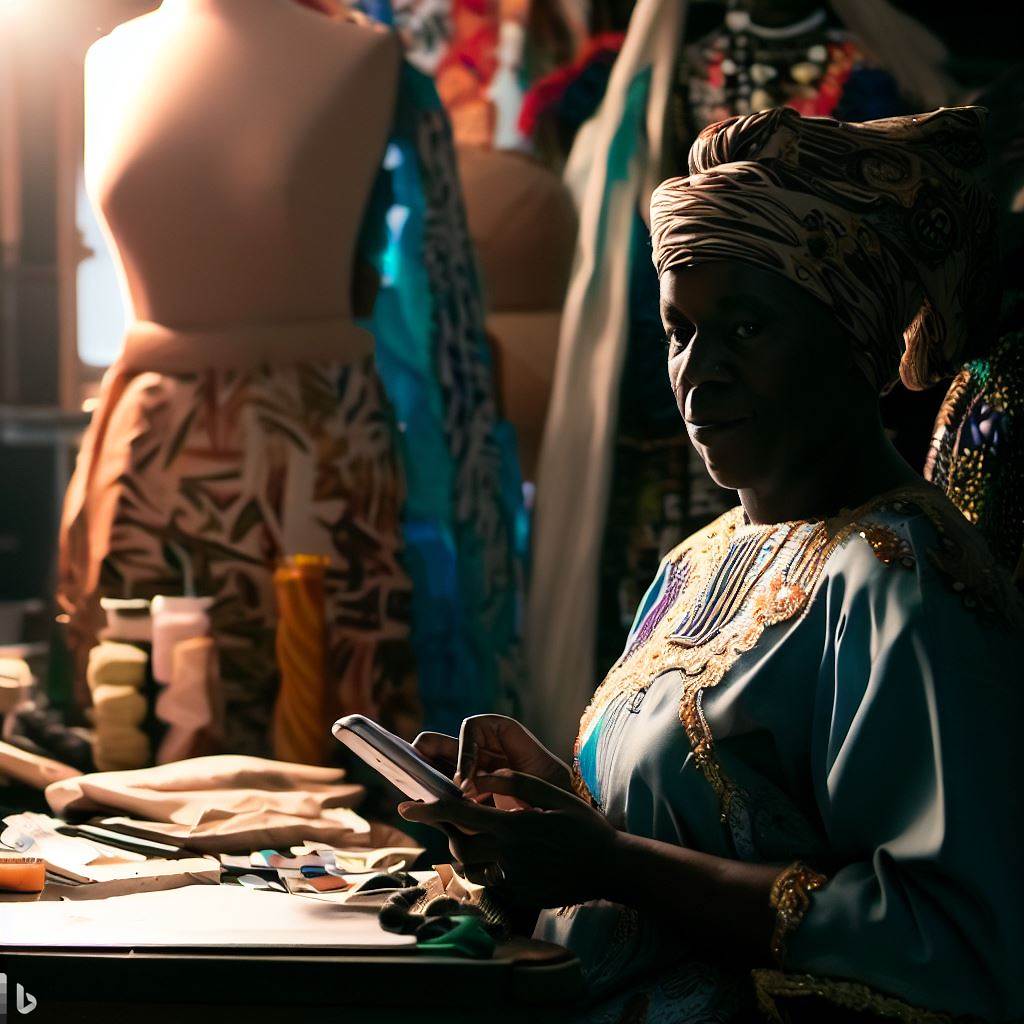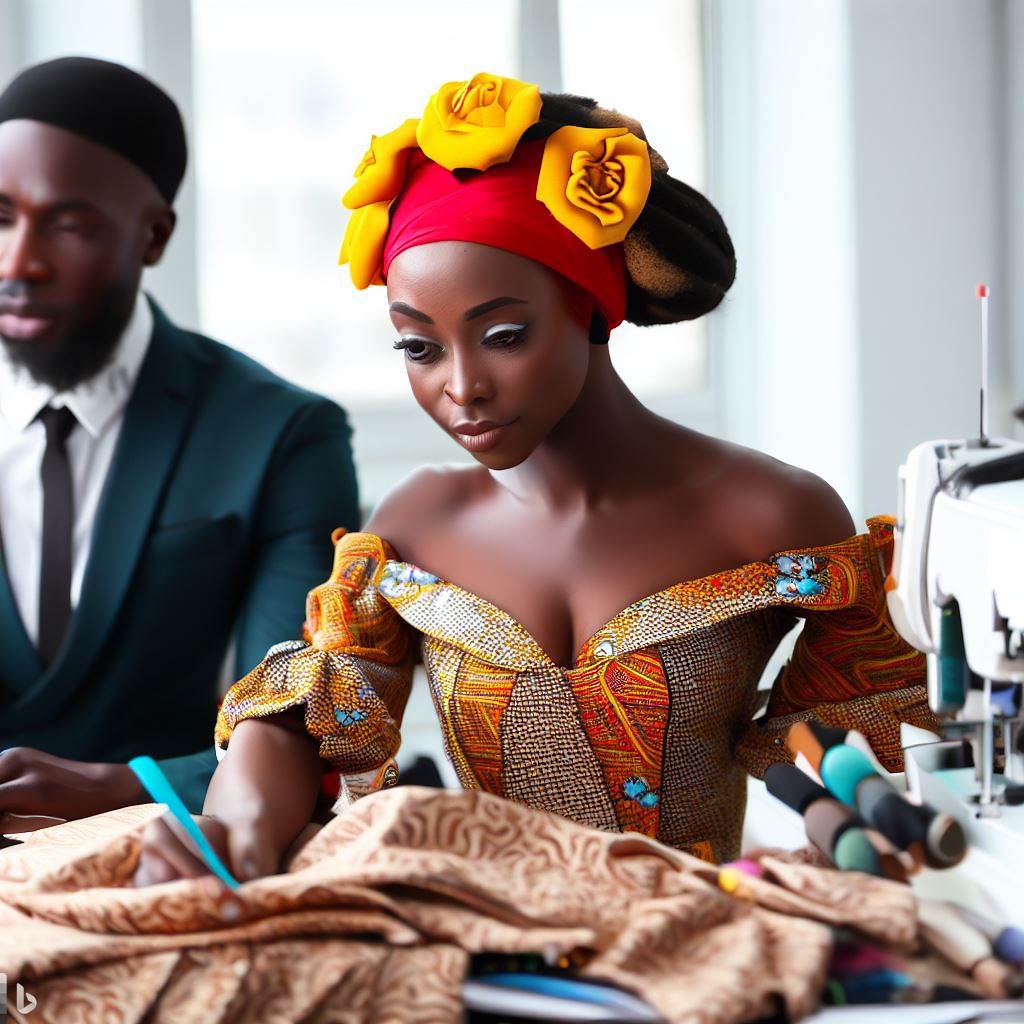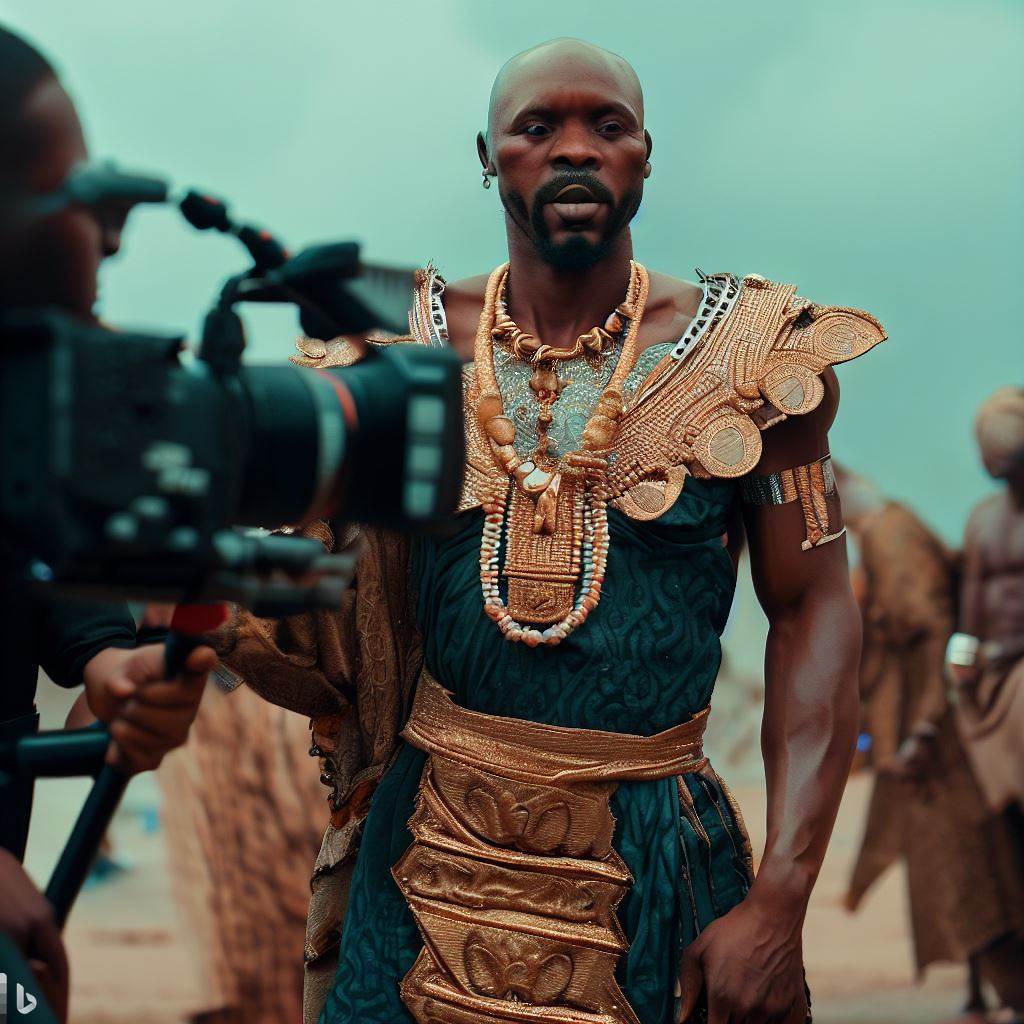Introduction
Fashion vs Film Costume Design Careers is a very interesting topic we are about to dive into.
Creating and styling costumes is both important in fashion, film even on the runway is vital.
Costume design is a vital aspect of the fashion and film industries in Nigeria. It involves the creation and styling of costumes for characters, whether in movies or on the runway.
This art form contributes to the overall aesthetic and narrative of a production, setting the mood and conveying crucial information about the characters.
In the world of fashion, costume design merges creativity, storytelling, and practicality to bring fashion collections to life.
Designers use fabrics, colors, and accessories to express their vision and captivate an audience.
Costume design in fashion allows designers to experiment with different styles and themes, pushing boundaries and defining new trends.
Similarly, in the film industry, costume design is essential for creating believable and visually striking characters.
Costumes help actors embody their roles, transforming them into the characters they portray.
By carefully selecting costumes, designers enhance the authenticity of the story and contribute to the visual appeal of the film.
In the section on Fashion vs Film Costume Design Careers, we’ll delve into the intricacies, challenges, and Nigeria’s unique opportunities.
Additionally, we will discuss the skills and qualifications required for success in these careers, shedding light on the evolving nature of costume design in the Nigerian creative landscape.
Fashion and Costume Design in Nigeria
A. Historical background
Nigeria has a rich history of fashion and costume design, with traditional clothing reflecting cultural diversity.
Traditional fabrics such as adire, ankara, and aso-oke have influenced modern fashion in Nigeria.
B. Influence of Nigerian culture on fashion and costume design
Nigerian culture, with its vibrant colors and bold patterns, has significantly influenced fashion and costume design.
Traditional Nigerian attire, like the agbada and gele, have become popular fashion choices both locally and internationally.
C. Emerging fashion trends in Nigeria
Nigeria’s fashion industry continues to evolve, with emerging designers gaining recognition for their creativity and innovation.
Nigerian fashion shows and events showcase the latest trends, bringing global attention to the country’s fashion scene.
D. Impact of Nigerian designers in the global fashion scene
Nigerian designers have garnered international acclaim, with their collections featured in prestigious fashion events and magazines.
Their unique blend of traditional Nigerian aesthetics and contemporary designs has captivated fashion enthusiasts worldwide.
E. Role of costume design in Nollywood (Nigerian film industry)
- Costume design plays a vital role in Nollywood, as it helps bring characters and storylines to life.
- Nigerian costume designers skillfully blend traditional and modern elements to create captivating and authentic looks for films.
In fact, fashion and costume design in Nigeria have deep historical roots and are heavily influenced by the country’s diverse culture.
Emerging fashion trends showcase the creativity and innovation of Nigerian designers, who have made a significant impact in the global fashion scene.
Additionally, costume design plays a crucial role in Nollywood, adding authenticity and enhancing the overall cinematic experience.
Read: Steps to Starting Your Costume Design Business in Nigeria
Exploring Fashion as a Career in Nigeria
A. Education and training opportunities for aspiring fashion designers
- Fashion design courses and programs are offered in various institutions across Nigeria.
- Students can pursue degrees and diplomas in fashion design to acquire the necessary skills.
- Training opportunities are also available through apprenticeships and internships with established designers.
B. Challenges faced by fashion designers in Nigeria
- High competition within the industry makes it difficult for new designers to stand out.
- Limited access to resources and funding inhibits the growth and expansion of fashion businesses.
- It is challenging to build a sustainable brand amidst the highly dynamic fashion landscape.
C. Successful Nigerian fashion designers and their journeys
- Deola Sagoe, a renowned designer, started her brand in the early ’90s and gained international recognition.
- Mai Atafo, a former banker, transitioned into fashion and has dressed top Nigerian celebrities.
- Lisa Folawiyo, known for her innovative use of Ankara fabric, has showcased her designs globally.
D. Steps to establish a successful career in fashion design
- Develop a unique design aesthetic and signature style that sets you apart from competitors.
- Build a strong network within the fashion industry through collaborations and networking events.
- Continuously improve your skills and stay updated with the latest fashion trends and techniques.
- Create a solid business plan and seek funding opportunities to support the growth of your brand.
- Embrace social media and online platforms to effectively market and promote your designs.
- Establish partnerships with local retailers and fashion outlets to expand your reach and customer base
Read: Costume Designers: Unsung Heroes of Nigeria’s Cinema
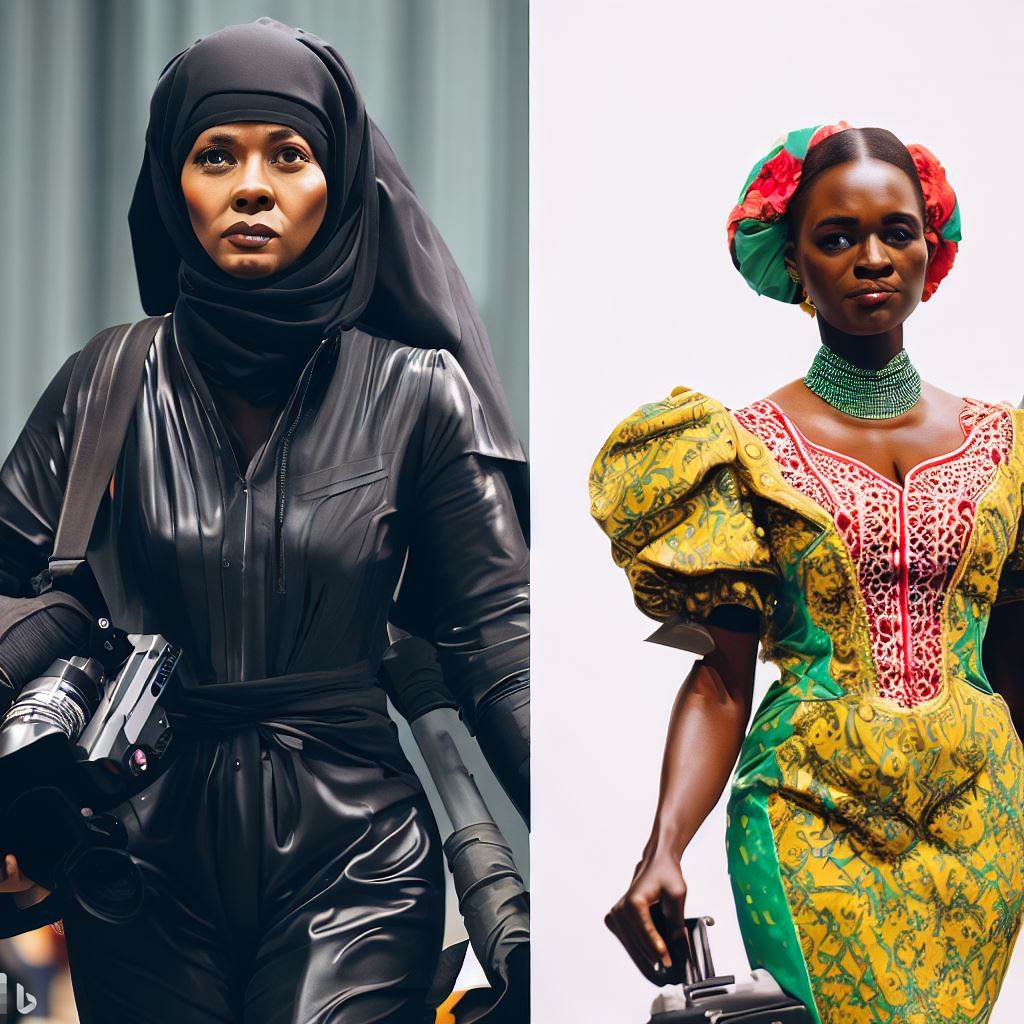
Find Out More: Costume Design: Nigeria’s Soft Power in African Fashion
Considering Costume Design for Film in Nigeria
A. Importance of costume design in the film industry
Costume design is pivotal in the film industry, shaping characters and enhancing storytelling through attire.
- Beyond aesthetics, costumes provide visual cues about a character’s personality, status, and era, aiding character development and narrative depth.
- They immerse viewers in the film’s world, making it relatable and believable.
- Collaborating closely with directors and actors to ensure costumes align with the character’s essence.
- Historical accuracy and cultural authenticity are crucial for creating immersive experiences.
- These costumes can elevate a film’s visual appeal and contribute to its overall artistic merit.
- Iconic costumes can become timeless symbols of cinema, leaving a lasting impact on pop culture.
- In essence, costume design bridges the gap between the script and the screen, translating words into captivating visual stories.
Consequently, it’s an essential element that enriches the film industry, making it more engaging, memorable, and culturally significant.
B. Collaboration between costume designers and filmmakers
Costume designers collaborate closely with filmmakers to ensure that costumes align with the overall vision of the film.
C. Skills and qualifications required for a career in costume design
A career in costume design requires a combination of creativity, technical skills, and a deep understanding of cultural and historical contexts.
- Creativity: Imaginative ideas for unique costumes.
- Sewing Skills: Proficient in garment construction.
- Research Skills: Historical and cultural knowledge.
- Collaboration: Work closely with directors and actors.
- Communication: Express ideas and vision effectively.
- Budget Management: Efficiently allocate resources.
- Attention to Detail: Precise costume execution.
- Adaptability: Handle diverse genres and eras.
- Textile Knowledge: Understand fabric properties.
- Problem-Solving: Address costume challenges creatively.
A career in costume design demands a blend of artistic flair and practical expertise, ensuring captivating and authentic costumes in the world of entertainment.
D. Challenges faced by costume designers in Nigeria
- Budget limitations: Costume designers in Nigeria often face budget limitations, which can restrict their creative freedom and limit their ability to create high-quality costumes.
- Limited recognition and support: They struggle to gain recognition and appreciation for their work, making it challenging to establish successful careers.
- Meeting the demands of diverse film genres: Nigeria’s diverse film industry challenges costume designers to accurately represent various genres with their creations.
E. Notable Nigerian costume designers and their impact
- Dele Akinyemi: Dele Akinyemi is a renowned costume designer in Nigeria known for his work in movies like “The Figurine” and “October 1”.
- Obijie Oru: Obijie Oru has made significant contributions to Nigerian filmmaking with her creative costume designs in movies like “The Wedding Party” and “King of Boys”.
- Dimeji Ajibola: Dimeji Ajibola is recognized for his exceptional work in movies such as “76”, “Mokalik”, and “Phone Swap”.
- Pat Obi: Pat Obi is a talented costume designer known for her work in movies like “Half of a Yellow Sun” and “The CEO”.
Through their innovative designs, these costume designers have made a lasting impact on the Nigerian film industry.
In essence, costume design is a vital aspect of filmmaking in Nigeria. Despite the challenges faced by costume designers, their contributions cannot be undermined.
Their ability to bring characters to life and enhance storytelling with their creative designs is invaluable.
The recognition and support for costume designers in Nigeria need to be elevated to create a thriving industry.
These Nigerian costume designers set a benchmark, inspiring aspiring designers to conquer challenges and leave their mark in film.
Read: Innovation and Creativity: Keys to Nigerian Costume Design
Similarities and Differences: Fashion Design vs. Costume Design
Achieving success in the fields of fashion and costume design requires a unique set of skills and knowledge. While the two may seem closely related, they differ in certain aspects.
Let’s explore the core similarities and differences between fashion and costume design.
A. Core skills and knowledge required for both fields
- Strong drawing and illustration skills, as well as an eye for detail, are vital for both fashion and costume designers.
- Both fields require a deep understanding of fabrics, textiles, and garment construction techniques.
- Knowledge of historical fashion trends and contemporary styles is essential to create authentic designs.
- Proficiency in using design software, such as Adobe Illustrator or Photoshop, is advantageous for designers in both fields.
B. Creative process and inspiration sources
- Both fashion and costume designers rely on a creative process that involves brainstorming, sketching, and refining design ideas.
- While fashion designers often draw inspiration from current fashion trends and personal style, costume designers find inspiration in historical research and script analysis.
- Costume designers also need to understand the characters’ personalities, motivations, and cultural backgrounds to create costumes that reflect their essence.
C. Collaborations and interactions with other professionals
Fashion designers often collaborate with photographers, models, stylists, and makeup artists to showcase their designs in fashion shows or photo shoots.
On the other hand, costume designers work closely with directors, production designers, and actors to bring characters to life in films, theater, or television productions.
Both fields require effective communication and the ability to collaborate with a team to ensure the desired outcome is achieved.
D. Varied work environments and opportunities
- Fashion designers have the opportunity to work for fashion houses, start their own labels, or contribute to the design teams of renowned brands.
- Costume designers can work in the film industry, theater productions, television shows, or even theme parks, creating costumes for various characters and settings.
- Freelance opportunities are also abundant in both fields, allowing designers to work on individual projects or collaborations.
E. Personal preferences and factors to consider for career choice
- Individuals with a love for trends, ready-to-wear clothing, and creating collections may find fashion design more suitable.
- If storytelling, historical research, and creating one-of-a-kind costumes for characters excite you, costume design might be a perfect fit.
- It’s important to consider personal preferences, career goals, and the type of work environment that suits your creative process.
- Both fashion and costume design offer rewarding careers, and the choice ultimately depends on your passion and interests.
In short, fashion and costume design overlap in drawing skills and garment construction knowledge but differ in inspiration, collaboration, and work settings.
Understanding these similarities and differences can assist aspiring designers in making informed career choices.
Read: Current Trends in Nigerian Costume Design Profession
Conclusion
Fashion and costume design play a significant role in Nigeria’s vibrant cultural and entertainment industries.
They not only showcase the nation’s rich heritage but also contribute to the economy and create opportunities for talented individuals.
If you have a passion for fashion and costume design, Nigeria is the perfect place to pursue your dreams.
With a growing fashion industry and a thriving film sector, there are ample possibilities for success.
In order to excel in the competitive world of fashion and costume design, it is crucial to never stop learning and evolving.
Stay updated with the latest trends, techniques, and technologies to remain relevant and innovative.
By combining creativity, cultural understanding, and business acumen, aspiring designers and costume enthusiasts can carve out successful careers in Nigeria’s fashion and film industries.
The possibilities are endless, and with dedication and hard work, dreams can become reality.

